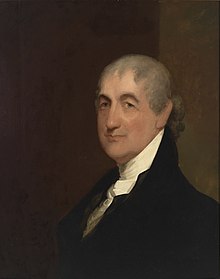
Back كاليب سترونغ Arabic كاليب سترونج ARZ Caleb Strong German کلب استرانگ Persian Caleb Strong French Caleb Strong Hungarian Caleb Strong Italian ケイレブ・ストロング Japanese Caleb Strong Latin Caleb Strong Polish
Caleb Strong | |
|---|---|
 Portrait attributed to Gilbert Stuart | |
| United States Senator from Massachusetts | |
| In office March 4, 1789 – June 1, 1796 | |
| Preceded by | None |
| Succeeded by | Theodore Sedgwick |
| 6th and 10th Governor of Massachusetts | |
| In office June 5, 1812 – May 30, 1816 | |
| Lieutenant | William Phillips Jr. |
| Preceded by | Elbridge Gerry |
| Succeeded by | John Brooks |
| In office May 30, 1800 – May 29, 1807 | |
| Lieutenant | |
| Preceded by | Governor's Council (acting) |
| Succeeded by | James Sullivan |
| Member of the Massachusetts Senate | |
| Personal details | |
| Born | January 9, 1745 Northampton, Province of Massachusetts Bay, British America |
| Died | November 7, 1819 (aged 74) Northampton, Massachusetts, U.S. |
| Political party | Pro-Administration Federalist |
| Alma mater | Harvard College |
| Profession | Lawyer, politician |
| Signature | |
Caleb Strong (January 9, 1745 – November 7, 1819) was an American lawyer, politician, and Founding Father who served as the sixth and tenth governor of Massachusetts between 1800 and 1807, and again from 1812 until 1816. He assisted in drafting the Massachusetts State Constitution in 1779 and served as a state senator and on the Massachusetts Governor's Council before being elected to the inaugural United States Senate. A leading member of the Massachusetts Federalist Party, his political success delayed the decline of the Federalists in Massachusetts.
A successful Northampton lawyer prior to 1774, Strong was politically active in the rebel cause during the American Revolutionary War. He played an influential role in the development of the United States Constitution at the 1787 Philadelphia Convention and, as a U.S. Senator, in the passage of its 11th Amendment. He also played a leading role in the passage of the Judiciary Act of 1789, which established the federal court system.
Adept at moderating the sometimes harsh political conflict between Federalists and Democratic-Republicans in Massachusetts, he navigated the state in a Federalist direction through the early years of the 19th century as the rest of the country became progressively more Republican. Although he sought to retire from politics after losing the 1807 governor's race, the advent of the War of 1812 brought him back to the governor's office as a committed opponent of the war. He refused United States Army requests that state militia be placed under army command and in 1814 sought to engage Nova Scotia Governor John Coape Sherbrooke in peace talks. The state and federal governments' weak defense of Massachusetts' northern frontier during Strong's tenure contributed to the successful drive for Maine's statehood, which was granted in 1820.
© MMXXIII Rich X Search. We shall prevail. All rights reserved. Rich X Search